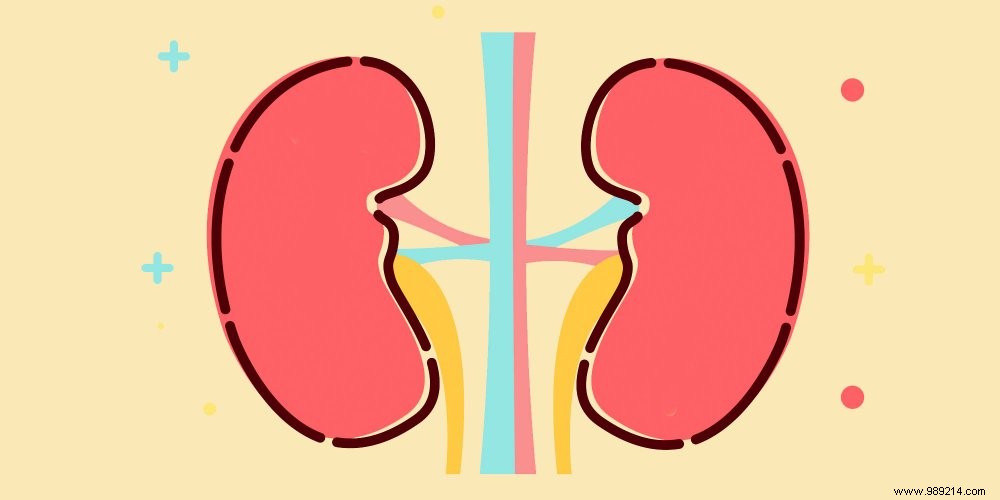 The kidneys are essential organs for maintaining essential physiological functions. However, many people suffer from kidney disease. Pathologies that could be avoided by following a few simple rules.
The kidneys are essential organs for maintaining essential physiological functions. However, many people suffer from kidney disease. Pathologies that could be avoided by following a few simple rules. It is our body's sewage treatment plant. Every day, our kidneys, in addition to transforming and rejecting waste from our body, also produce hormones and play a key role in calcium metabolism. With the lungs, they ensure the acid-base balance of the body by modulating variations in blood pH. Finally, they regulate blood pressure by producing renin, a key enzyme involved in vasoconstriction.
But did you know that after the age of 40, renal filtration begins to decrease by about 1% per year? In the long term, the risk is to develop kidney disease, all the more sneaky as it evolves silently.
Therefore, it seems essential to take care of your kidneys, as Dr. Corinne Isnard Bagnis, nephorologist, professor of nephrology at the Sorbonne-University and deputy head of department at the Pitié-Salpêtrière hospital, reminds us in her book Impossible urination:take care of your kidneys, they will help you (Editions du Rocher, September 2020).
Good kidney health starts on the plate. Eating a balanced diet helps prevent overweight, diabetes and hypertension, factors that promote kidney disease.
A September 2019 Australian study, published in the Journal of American Society of Nephrology , confirms that the Mediterranean diet is the most suitable. Opting for a diet rich in fruits and vegetables, nuts or almonds, whole grains, legumes and fish would indeed reduce the risk of kidney disease by 30% according to researchers.
Video of the day:Also add a few berries and fermented milk products to the menu to protect your urinary microbiota, whose imbalance is the cause of many kidney stones, cystitis and urinary incontinence.
Also, don't forget to stay hydrated. The body needs one and a half liters of water a day. In general, there is no need to go beyond this recommendation except in cases of high heat, sweating or diarrhea. Another exception:people who tend to suffer from urinary tract infections or kidney stones must dilute their urine more and, for this, drink about 2 liters a day. This volume includes not only water, but also tea, coffee, infusions and all liquids provided they are without added salt or sugar.
Finally, limit your salt intake. The French population has on average too high a consumption (about 8 to 9 g per day). Repeated excesses are a source of hypertension, one of the major causes of progressive kidney degradation. A maximum of 6-7g per day would be best for kidney health. To enhance the taste of dishes, salt can easily be replaced with gomasio, spices or herbs.
Be careful of self-medication. Overconsumption of non-steroidal anti-inflammatory drugs, such as ibuprofen, is also a threat to the kidneys, insofar as they reduce the caliber of the blood vessels that irrigate them.
This is why the National Agency for the Safety of Health Products and Medicines (ANSM) recommends "using them at the minimum effective dose for the shortest duration:no more than 3 days in the event of fever and no more than 5 days in case of pain." The same goes for laxatives and diuretics.
You should also avoid so-called "healing" herbs, food supplements and more generally any product whose composition is not clearly identified. If you are a smoker, quit smoking. The latter leads to the deterioration of kidney function and multiplies by 4 the risk of developing kidney failure.
To preserve your kidneys, it is essential to practice physical activity. The recommendations of the National Health Nutrition Program (PNNS) are 10,000 steps or 30 minutes of activity per day minimum.
France Rein also recommends not staying more than 48 hours without having practiced a physical activity. This allows, regardless of age, to reduce the risk of cardiovascular disease, diabetes, but also obesity.
There is no age to start regular physical activity. You have to go gradually, starting with a moderate activity that you like (gardening, DIY, etc.). Walking, for example, is easy to practice every day. Find out about the clubs and associations near you that offer activities (hiking, dancing, aquagym) in a friendly atmosphere.
Never go beyond your limits. Allow warm-up and cool-down times of 5-10 minutes. Finally, some good reflexes already allow you to increase your physical activity on a daily basis:avoid taking the elevator, walk the dog, do not systematically take the car (or park it a little further than the place where you are going ).
Kidney diseases are said to be "silent" because they show no noticeable symptoms. France Rein and the Kidney Foundation strongly recommend getting tested, especially when you are affected by diabetes, obesity, cardiovascular disease or even an autoimmune disease.
Screening consists of a urine dipstick test or urine analysis in a medical analysis laboratory. The presence of blood or albumin in the urine signals kidney dysfunction or the onset of kidney disease.
According to the Kidney Insufficiency Network in New Caledonia (RESIR), 10% of kidney failure could be avoided and 30% could be delayed for many years subject to early detection and appropriate treatment.
Read also: